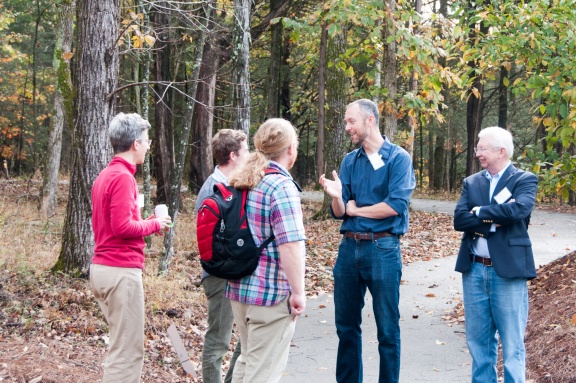Vanderbilt Department of Biostatistics Hosts Its 1st Mixer at the Joint Statistical Meetings (JSM) of 2018
On Sunday, July 29, the Vanderbilt Department of Biostatistics hosted its first ever Vanderbilt Night mixer at the Joint Statistical Meetings (JSM) of 2018 held in Vancouver, British Columbia. This is one of the largest statistical events to take place in the entire world!
Amazingly, there were more than 6,500 attendees, visiting from 52 countries. More than a thousand of those attendees were students.
After a full day of meetings and courses, our Department faculty, staff, students, alumni and several special guests attending JSM, gathered together to eat, drink, and be merry.
By hosting the Vanderbilt Night mixer, we were able to shed more light on our biostatistics program at Vanderbilt to those in the medical research community, while giving all of our department members a chance to unwind and talk more on a personal level.
The event was so enjoyable that most stayed for the full two hours catching up and visiting like old friends do. The food was great, the city was awesome, and everything went off without a hitch!
Thanks to everyone who was able to join us for the Vanderbilt Night mixer and we'll look forward to hosting another mixer at JSM 2019!
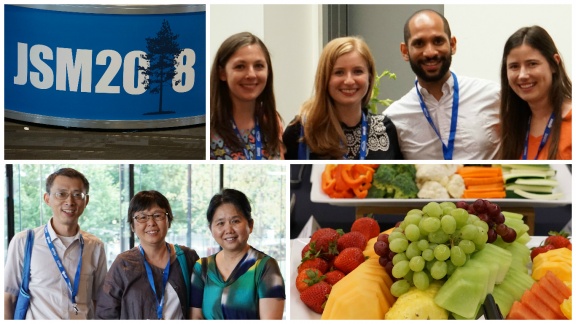
Spotlight on Vanderbilt Biostatistics: Jennifer Thompson
For our next featured member in the Spotlight series, we talked to Jennifer Thompson, a Biostatistician IV in the Vanderbilt Department of Biostatistics, to learn more about her research and outside interests. Read on and enjoy!
What is the focus of your research and what have been the major findings so far?
My primary work so far has been with the Vanderbilt Center for Critical Illness, Brain Dysfunction and Survivorship. We work to describe, understand, and improve in-hospital and long-term outcomes among patients and families who experience acute critical illness. The center currently has about ten principal investigators and an incredible support team, all doing multidisciplinary work in pulmonary/critical care, anesthesiology, psychiatry, trauma, and palliative care research.
In 2013, we published an NIH-funded cohort study which described the huge burden of cognitive impairment among survivors of critical illness and how brain dysfunction during that illness is a risk factor for worse outcomes. We are currently working on R01 grants which look at the efficacy of medications used to treat delirium in the ICU, and outcomes for the use of different sedatives in ICU patients.
We have also worked to understand the mechanisms and phenotypes of delirium in the medical and surgical ICUs, to characterize and look for risk factors for brain dysfunction in trauma patients, and look for predictors of frailty and long-term functional and cognitive problems in ICU survivors so that we can try to modify our care and improve their experiences.
What was your draw to statistics and what lessons have you learned from being a biostatistician?
I'm analytical and practical by nature, and declared a math major in college without too much thought as to what I would do after graduation. I was exposed to biostatistics through a summer internship at TVA (of all places!), and realized it would be a perfect way to apply my analytic skills to important problems. After I finished my master's at UNC-Chapel Hill, Vanderbilt was hiring and I was able to move back to Tennessee, my home state.
The lessons I've learned over the years have been enormous! Of course my statistical knowledge has grown immensely, but I've also learned how to manage timelines and projects and personalities, and to communicate with all kinds of people - some of whom care deeply about the statistical details, and some of whom care not at all. :) I love being part of a team that truly works together to solve important problems, and biostatistics and my work here has been a great way to do that.
What is your best advice for aspiring statisticians?
My best advice is to have a mindset that is open to continually learning new things, both about data science/statistics and the subject area you're working with. It didn't take me long out of graduate school to realize how little I didn't know yet! And with statistics and clinical research in general constantly evolving, you'll never be finished, which is a little overwhelming but also really exciting.
Also, I cannot overemphasize how important communication is to this field. Your statistical theory means nothing to a clinical researcher if you can't explain what the numbers and Greek letters actually mean - and in a way that you and they can then explain to their clinical colleagues so that your work can actually make an impact. Sometimes this looks like just writing an email or speaking up in a meeting; sometimes it's creating a clear, concise data visualization that gets your message across better than three paragraphs of a Results section ever could. Often it will be both.
What makes Vanderbilt special in your experiences of collaborating with others?
One thing I so appreciate about the group I work with is that my statistical teammates and I are considered to be part of the team, rather than technical consultants who hit a few buttons and give them some numbers to plug into their manuscript. That has so much benefit for both sides, and serves to not only make my work life more fulfilling, but also to make the science better.
I'm really excited about current movement in the direction of openness and transparency in research. It's been a bit slow going in clinical arenas compared to other areas, given the hugely important concerns about patient privacy as well as other considerations, but I hope that it will soon be expected practice to share analytical code, make statistical analysis plans obviously and transparently available, etc.
Tell us about your life outside of Vanderbilt.
I love to both travel as often as I can (most recently to Japan!), and have Nashville as a home base - this is such a great city undergoing so much transition right now, and I'm excited to be here to watch and participate in it. I'm lucky enough to also live close to five nieces and nephews who get as much of my attention as they'll allow. Outside of work, I'll often be found hiking in one of the parks around town, spending time with my friends and community here, watching movies at the Belcourt or seeing just about anyone at the Ryman.
Finally, what is something about you that most people at Vanderbilt still don't know about you?
I didn't see the original Star Wars movies until 2010, when I was unexpectedly snowed in with my family for Christmas and we watched the entire series in a SyFy marathon.
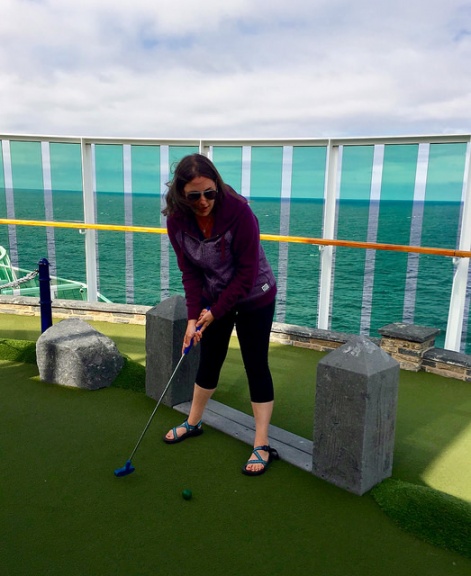
Spotlight on Vanderbilt Biostatistics: Mario Davidson, Ph.D.
To begin our new series, Spotlight on Vanderbilt Biostatistics, we are excited to feature one of our faculty members, Mario Davidson, Ph.D., Assistant Professor in Biostatistics. Read on to learn more about his research and outside interests:
What is your research focused on and what is the potential impact?
My current collaboration is with the School of Medicine. A few years ago the curriculum for medical students changed. Under the previous curriculum, students were in lecture halls a lot during their first few years; with the new curriculum, they are seeing patients right off the bat in their first year.
The curriculum has been embraced by experts and is moving toward competency based education. Students take different courses, have multiple clinical rotations, and are measured in various ways by a variety of clinicians. Students are assessed frequently using milestones, such as behavioral anchors, entrustable professional activities, simulations, and more. The students receive feedback right away and can implement changes using their new knowledge; however, it can be difficult to assess the success and impact of the new curriculum.
Much of the data is taken on a 5-point Likert scale. It is qualitative and quantitative, and there is a great deal of small numbers of observations for many assessments. This lends to messy data and the typical analyses do not tend to resolve our main questions: Is the curriculum working? How can we assess when the students are ready for promotion?
To add, because this curriculum is cutting edge we are the pioneers and we do not have gold standards to measure our data against. However, if all goes well, this research will serve the student better and be useful in helping other curriculums attempting to use our school’s model.
Tell us about a significant publication in your career.
I recently had my first, first-author paper accepted. It took three years to finally get it approved. Admittedly, the peer review process worked. I’m a better writer for it and the paper’s final draft is substantially better than the first. I’m very excited about it!
I teach a statistical collaboration course in our department and decided to discuss the curriculum in this publication. When I began developing the curriculum, I was surprised by how little research was out there on this type of course. Institutes that offer a course like this one are not streamlined by any means. Some places have an internship; others have consulting services; and others allow their students to shadow a mentor. These courses are very different from the typical “hard” skill courses such as regression, theory, categorical data, etc.
I was shocked when I had to piece together the important topics based on the dearth of literature, and perhaps even more shocked when I realized that it was difficult to have a course that addressed all of the important suggested topics. With a little creativity, trial and error, and advice from people like Jeffrey Blume and Matt Shotwell, I developed a curriculum that tackled all of the topics in a feasible manner. Our course focuses on working with clients, asking questions, communicating effectively, being professional, managing one’s time, working ethically, and much more.
If you are interested in learning more about it, click here.
What was your draw to statistics?
My father is the local newspaper’s sports editor and writer and as a kid, he’d take me to the basketball and football games. One of the things I enjoyed most about those experiences was the stats sheets. As a journalist, he’d receive the stats for the game after the halves and final quarters and I enjoyed reading and “analyzing” them.
When I was trying to figure out what I’d major in in college, someone asked me about my interest and told me that actuarial science may appeal to me. I agreed and went to Tennessee State University as a math major. I fell in love with statistics when I had my first class. Unlike my other mathematical courses: Cal I – Cal IV, I did not have to ask, “Why?” It was so obvious that what we were learning was relevant and useful. I suspect somewhere in between my interest in mathematics and my enjoyment at the games I discovered that I wanted to focus on statistics.
What is your best advice for aspiring statisticians?
My best advice for aspiring statisticians is to use school to learn as much as you can and to learn to work with others. As John Donne said, “No man is an island.” When I was in school, I had a peer who worked part time. He’d take classes and go back to work afterward. So while most of us didn’t work or had a TA or an RA position, we had an opportunity to hang around the university all day. We were able to learn from one another and to help each other when we got stuck. He didn’t initially, and struggled because of it. During his second year, he started hanging out more with others in the Department and his understanding dramatically improved.
Another piece of advice I would offer is to constantly work on your communication. We write and talk a lot to researchers, statisticians, students, administrators, staff, etc. We prepare grants, analysis plans, emails, presentations, papers, and reports. One cannot underestimate the ability to communicate. Even more, because we deal with so many people, conflicts arise and difficult situations may take place. When you communicate well, you can stave off a lot of situations before they occur, and stifle many that do occur.
What is your teaching philosophy?
As far as my philosophy, here are the take home points:
Teachers should be somewhat entertaining, teach with real world situations, and provide opportunities for group work and a variety of feedback.
It’s important to recognize that we all learn differently and thus teachers should use various modalities.
I personally believe in constructivism whereby the learner builds their own knowledge. Statistical/mathematical educational research has shown that students learn better when interacting, working in groups. I don’t believe lecturing is bad; it lends itself well to certain exercises and topics. However, I don’t feel it is the most effective way to reach the learner in general. We should try flipped classrooms, multimedia, group work, discovery, labs, problem-based and project based methods, simulations, videos, case-based learning, etc. Juxtaposed with providing assessments and feedback, I believe students learn better with these approaches. Ultimately, I strongly believe in student-centered methods; these methods are interactive and engaging.
What makes Vanderbilt special?
Vanderbilt has a wonderful culture! I’ve been working at Vanderbilt a little over ten years now and I’ve learned a lot about statistics, medicine, and people. We have so many talented faculty, staff, and students and I’ve seen our department grow in wonderful ways. People are doing cutting edge research; getting grants and being published in top journals like NEJM, Biometrics, and Cancer. Not to mention, our graduate program is providing a world class education. It is innovative, teaching Bayesian, Frequentist, and Likelihood approaches and currently is developing a data science program. The amount of detail that goes into developing the curriculum and maintaining high standards of learning are second to none in the School of Medicine.
Tell us about your life outside of Vanderbilt.
Family, music, and baseball are my life and love. I’m coming up on twenty years of marriage on July 4th and my wife and I have two boys. During the Spring and Fall baseball season, you’ll find me coaching both of my kids most days during the week. I’m a big fan of the game. I'm from East St. Louis, IL; which is in the St. Louis area, and both of my sons’ teams are named “Cardinals”-- Go Cardinals!
My other hobby is playing and teaching music. I play the trombone, tuba, baritone, and piano. I play with a big band and a cover band. You can catch me playing, scatting, and improvising around town.
I also give my nephew private lessons on trombone, as well as teach my sons about music theory, singing and playing. During our commute to school each Monday through Thursday I spend the first 10-15 minutes reviewing and by now they know all of their scales and can sing and hear solfege without a piano.
If you’re wondering why I don’t teach them on Friday, it’s because one day they asked, “Dad, do you mind if we don’t do this on Friday?” They’ll thank me later, right? My oldest is playing bassoon and my youngest is working on trumpet.
Finally, what is something fun or quirky that most of your colleagues still don't know about you?
I played in President Clinton’s inaugural parade with Tennessee State University’s Aristocrat of Bands. It was cold and that parade was the first time that I marched with an upright baritone. By the end of the parade my whole chest cavity was sore; that upright baritone is not for the faint of heart.
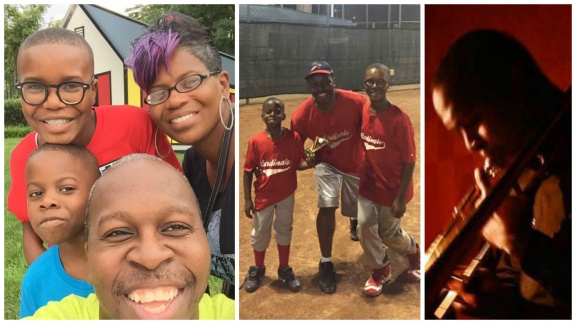
New Series: Spotlight on Vanderbilt Biostatistics
This week we are excited to launch a brand-new series called Spotlight on Vanderbilt Biostatistics. The purpose of this series is to provide a more candid look at the individual people in the department, going beyond their titles to learn more about them to find out what makes them “tick.”
Our faculty, staff and students are wonderful to work with and have talents in many areas that go far beyond biostatistics. They bring new ideas, insights and perspectives that allow us to grow and move forward together as a department. We encourage and support one another as a group and seek to work collaboratively with those both inside and outside of our department to build a strong community of researchers working towards a greater cause.
We value our colleagues and look forward to the opportunity to highlight their expertise, skills and interests to build a stronger connection with those we work beside. We are more than just the science we perform and we hope this series lets that shine through.
A major “thank you” goes out to Mario Davidson, Ph.D., Assistant Professor of Biostatistics, as it was his idea that sparked this new series. It seemed most fitting to begin by highlighting him to help get things started and to help model the series to all.
To read the first entry in the Spotlight on Vanderbilt Biostatistics series, simply click here.
If you are a member of our Department and would like to volunteer to be featured as an upcoming guest in this series, be sure to send an email to Robbie Luckett at robbie.luckett@vumc.org. From there, you will be contacted with a short list of questions to get things started.
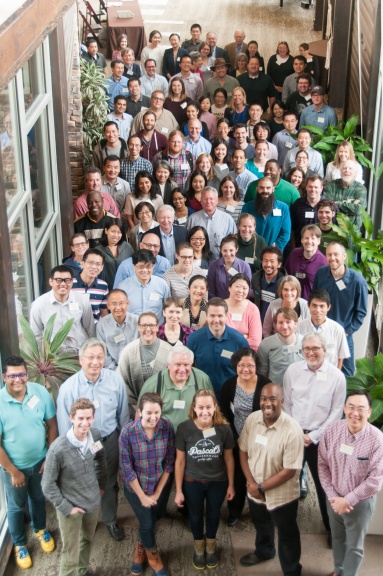
Our Strategic Planning Retreat in November 2017: Vanderbilt University's Department of Biostatistics
Our highly successful Strategic Planning Retreat engaged over 100 faculty, staff and students from the Department of Biostatistics to develop ideas about how to best achieve ‘better health through data. The entire department went through several months of planning, including creating a comprehensive compendium of current skills and expertise and developing guiding vision and mission statements.
During the retreat, the group worked through a series of brainstorming activities in small and large groups. Consensus themes emerged related to leading internationally recognized research, offering a world-class biostatistical collaboration infrastructure, and training the next generation of biostatisticians and clinical researchers. Department members also highlighted the importance of leadership locally and nationally, and of investing in the professional success of our faculty and staff.
Teams passionately expressed the importance of creativity, and the imperative to embrace an environment that fosters the development and dissemination of new ideas. They balanced the need to develop new biostatistical methods with new ideas for enhancing health-related research through strong biostatistical collaborations.
The practical application of biostatistical excellence and leadership through data coordinating centers was robustly explored and emphasized. Plenty of discussion focused on our graduate programs, highlighting their importance for ensuring health research of the future is led and supported by well-trained biostatisticians. Beyond training for methods excellence, clinical researchers need to be sufficiently savvy in quantitative methods to choose wisely and collaborate efficiently, and teams highlighted the opportunity for the department to lead in this endeavor locally and nationally.
A major thrust of the dialogue at the retreat surrounded appropriate positioning for sustainable success. The participants wanted to move beyond being great creators, collaborators and educators. The notion of national leadership and of leading within the institution was raised as being optimal for integrating methodological research and education into every facet of research.
Importantly, attendees felt this was a major approach to maximizing the impact of research in general. To achieve the research, education, collaboration and leadership goals, department members emphasized the importance of intentional career development and nurturing. The focus on people first rounded out deliberations and concluded a successful exploration of the goals and strategies that will help the department of biostatistics achieve its overarching goal of improving health through the use of data.
After the retreat, a draft strategic plan has been widely circulated for iterative feedback from every stakeholder. The plan has been refined and is now being vetted by external stakeholders. The next phase will be strategic implementation with continued engagement of every faculty member, staff and student to drive forward on our mission.
